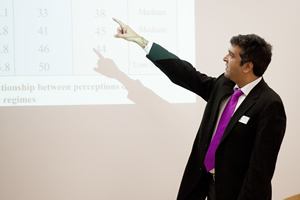International Trends in Lobbying Regulation: Lessons Learned for Ireland
Abstracts and Presentations
- Prof Frank Baumgartner - Lobbying in Washington DC
- Dr Raj Chari and Dr Gary Murphy - Regulating Lobbying: A Global Comparison
- Ms Lucy Cronin - Lobbying in Ireland: How does it measure up?
- Mrs Lynn Morrison - Shining Light on the Lobby: An Overview of Ontario's Lobbyists Registry
- Dr Stephen Stacey - The EU's register of interest representatives: why and how a company was 'named and famed'
The talk focused on selected findings from a recent book: Lobbying and Policy Change: Who Wins, Who
Loses, and Why by Frank R. Baumgartner, Jeffrey M. Berry, Marie Hojnacki, David C. Kimball, Beth L. Leech
lobbyists' undue influence. For the authors of Lobbying and Policy Change, the most extensive study ever
done on the topic, these promises ring hollow—not because politicians fail to keep them but because
lobbies are far less influential than political rhetoric suggests.
Based on a comprehensive examination of ninety-eight issues, this volume demonstrates that sixty percent
of recent lobbying campaigns failed to change policy despite millions of dollars spent trying. Why?
The authors find that resources explain less than five percent of the difference between successful and
unsuccessful efforts. Moreover, they show, these attempts must overcome an entrenched Washington
system with a tremendous bias in favor of the status quo.
Though elected officials and existing policies carry more weight, lobbies have an impact too, and when
advocates for a given issue finally succeed, policy tends to change significantly. The authors argue,
however, that the lobbying community so strongly reflects elite interests that it will not fundamentally alter
the balance of power unless its makeup shifts dramatically in favor of average Americans'concerns.
Dr Raj Chari and Dr Gary Murphy

By now, most jurisdictions can boast either regulation of the lobbying profession or at the very least a selfregulatory code. Behind the times, there is no regulation of lobbyists in Ireland nor does there appear to
be an intention to address this in the foreseeable future. And there is no self-regulatory code per se.
Indeed lobbying in Ireland differs considerably from lobbying in other European jurisdictions, not least
Brussels and London. This talk examined how in practice this affects the way in which lobbying is
undertaken in Ireland and what the impact, both positive and negative, this can have on outcomes.
Integrity Commissioner and Lobbyist Registrar Lynn Morrison spoke about recent changes in Ontario's
lobbyist regime, within the context of Canada's provincial and federal lobbyist rules. Mrs. Morrison
believes that clear rules and accessible registration systems can result in a transparent registry that benefits
elected officials, the public and the lobbyist community. Highlighting her own office's experiences over the
past 11 years, she spoke about the changing political climate regarding lobbyists, concerns about
ensuring activity does not go 'underground', and the need for frequent communication with stakeholders.
As part of his European Transparency Initiative, Member of the European Commission Siim Kallas launched a voluntary Register of Interest Representatives (the lobbyists' register) with a linked code of conduct in June 2008. At this point organisations involved in direct lobbying of the European institutions had to decide whether they would complete a registration form or not. Before the end of the year Toyota Motor Europe ('TME') made its entry thus becoming amongst the first to be, in the words of a Commission official, "named and famed."
This presentation explored the way in which TME reached its decision to register. What was the mix of external pressure to conform, internal commitment to transparency, and corporate desire to be visibly 'professional' that led the company to take this decision? Two years after registration, what impact has there been on the content and style of TME's lobbying? Has the fact that third parties have access to key details of TME's lobbying budget and activities as well as to those of its competitors had any consequence for the company? Now that TME has registered, has there been any change in attitude to it on the part of those lobbied? Looking further ahead, what changes to lobbying might there be if the European Commission and the European Parliament succeed in establishing a joint register in June 2011, as they hope? These are some of the questions this presentation will address.
Photographs © karinafinegan.com